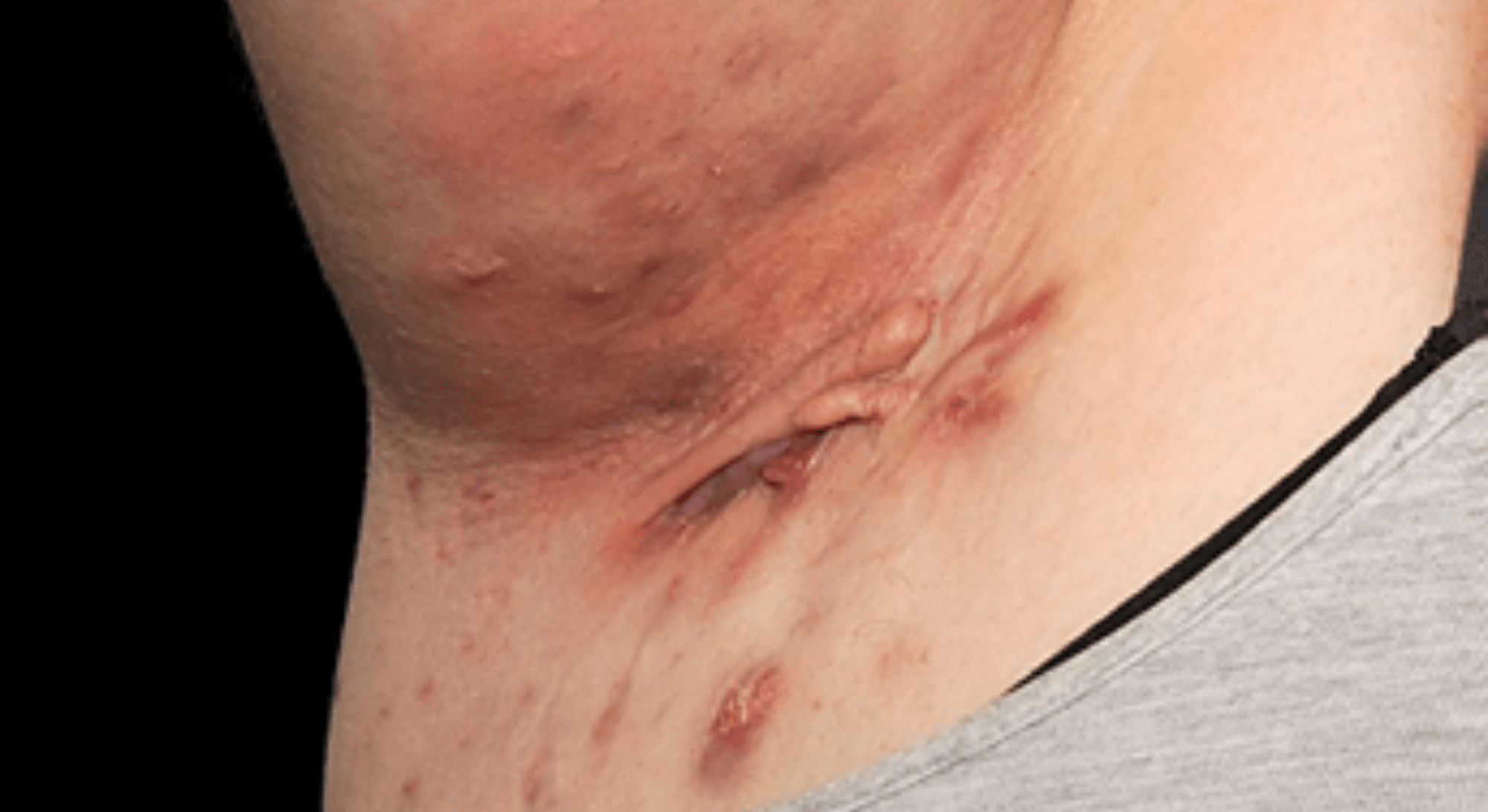HC Hidradenitis Suppurativa – Symptoms and Causes
Hidradenitis Suppurativa (HS), often referred to as “HC” in medical terms, is a chronic skin condition that can significantly impact a person’s quality of life. This condition is characterized by the development of painful, inflamed bumps or lesions in areas where skin rubs together, such as the armpits, groin, buttocks, and under the breasts. HS is more than just a skin issue; it can lead to physical discomfort, emotional distress, and social challenges. In this article, we’ll delve into the symptoms and causes of HC Hidradenitis Suppurativa.
Symptoms of HC Hidradenitis Suppurativa:
The symptoms of HC can vary in severity from person to person. The condition typically progresses in stages, with symptoms often worsening over time. The common symptoms of HC include:
- Painful Bumps or Nodules: One of the earliest signs of HC is the development of painful, red, and inflamed bumps or nodules. These lesions can vary in size and may resemble pimples or boils.
- Abscesses: As the condition progresses, the bumps can turn into abscesses, which are larger, pus-filled pockets that can be extremely painful and tender to the touch.
- Tunnels or Tracts: In more advanced cases of HC, tunnels or tracts can form under the skin, connecting the abscesses. These tunnels can become infected and cause further pain and inflammation.
- Leakage and Odor: The abscesses and tunnels can rupture, leading to the leakage of pus and a foul odor. This can be not only physically uncomfortable but also emotionally distressing.
- Scarring: Over time, as the lesions heal and reoccur, scarring can develop. The scarring can lead to changes in the skin’s texture and appearance.
- Limited Mobility: HC lesions often occur in areas where skin rubs together, such as the groin and armpits. The pain and discomfort can lead to limited mobility and difficulty in performing daily activities.
- Emotional Impact: The physical symptoms of HC can have a significant emotional impact. Many individuals with HC experience embarrassment, shame, and depression due to the visible and painful nature of the condition.
Causes of HC Hidradenitis Suppurativa:
The exact cause of HC is not fully understood, but it is believed to result from a combination of factors, including genetics, inflammation, and immune system dysfunction. Here are some of the key factors that contribute to the development of HC:
- Genetics: There is evidence to suggest that genetics play a role in the development of HC. If you have a family history of the condition, you may be at a higher risk of developing it yourself.
- Hair Follicle Blockage: HC is thought to begin with the blockage of hair follicles. This blockage can lead to inflammation and the formation of abscesses.
- Inflammation: Inflammation is a central feature of HC. The body’s immune response triggers inflammation around the blocked hair follicles, leading to the formation of painful lesions.
- Hormones: Hormones, particularly androgens (male hormones), may play a role in HC. This is evident from the fact that the condition often begins after puberty and is more common in women.
- Immune System Dysfunction: HC is considered to be an autoimmune-related disorder, where the immune system attacks healthy tissues, leading to the development of lesions and abscesses.
- Lifestyle Factors: While not a direct cause, certain lifestyle factors can exacerbate HC. These include obesity, smoking, and excessive sweating.
Treatment for HC Hidradenitis Suppurativa:
If you suspect that you have HC or are experiencing symptoms that resemble the condition, it’s important to seek medical attention. A dermatologist or healthcare professional can diagnose HC based on your symptoms and medical history. While there is no cure for HC, there are various treatment options available to manage the symptoms and improve your quality of life. These may include:
- Topical Treatments: Creams or ointments containing antibiotics or anti-inflammatory agents can help reduce inflammation and manage symptoms.
- Oral Medications: Antibiotics, hormonal therapies, and immune-modulating drugs may be prescribed to control inflammation and prevent new lesions from forming.
- Biologic Therapies: In more severe cases, biologic medications that target specific components of the immune system may be recommended.
- Surgery: Surgical procedures may be considered for draining abscesses, removing scar tissue, and managing more advanced cases of HC.
- Lifestyle Modifications: Making healthy lifestyle choices, such as maintaining a healthy weight, quitting smoking, and practicing good hygiene, can help manage HC symptoms.
In conclusion, HC Hidradenitis suppurativa is a chronic skin condition characterized by painful bumps, abscesses, and inflammation. While the exact cause is not fully understood, a combination of genetics, inflammation, and immune system dysfunction is believed to contribute to its development. Seeking medical attention and working closely with healthcare professionals can help individuals manage their symptoms and improve their quality of life. If you suspect you have HC, don’t hesitate to consult a healthcare provider for an accurate diagnosis and appropriate treatment.
